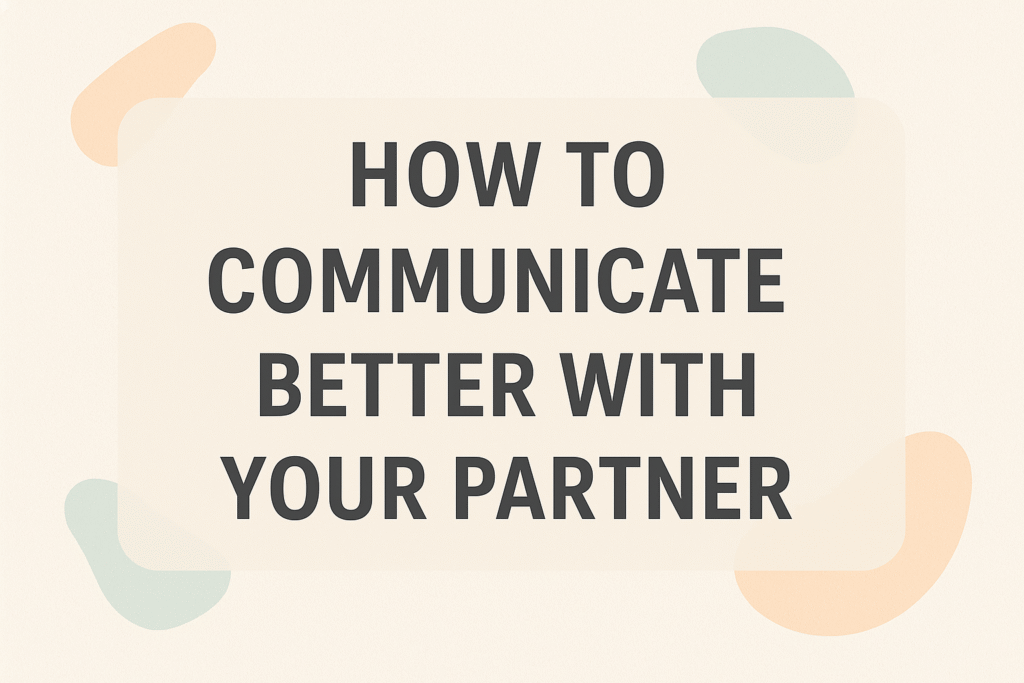Communication is the heartbeat of every healthy relationship. It’s how couples express love, resolve conflicts, and grow closer over time. But even the strongest relationships can struggle when communication breaks down. Whether you’re newly dating or have been together for years, learning how to communicate better with your partner can transform your connection and deepen your understanding of each other.
Here are some powerful, practical ways to improve communication in your relationship.
1. Listen to Understand, Not Just to Respond
Most people listen with the intent to reply — not to truly understand. When your partner speaks, give them your full attention. Avoid interrupting or planning your next sentence while they’re still talking.
Try active listening:
- Make eye contact.
- Nod or affirm with small gestures like “I see” or “I understand.”
- Reflect what they said (“So you feel upset because…”).
This shows empathy and reassures your partner that their feelings matter. Listening is often more powerful than offering advice.
2. Be Honest but Kind
Honesty builds trust, but how you say things matters just as much as what you say. Instead of being blunt or defensive, express your thoughts respectfully.
For example:
- Instead of saying: “You never listen to me!”
- Say: “I feel ignored when I’m sharing something important.”
Using “I” statements shifts focus from blame to emotion. This encourages your partner to listen rather than react defensively.
3. Choose the Right Time to Talk
Timing is everything. Avoid starting serious conversations when either of you is tired, stressed, or distracted. Instead, pick a calm moment when both of you can focus without interruptions.
If something upsets you, it’s okay to take a short break before talking. Cooling off prevents unnecessary arguments and helps you express your thoughts more clearly.
4. Don’t Assume — Ask
Misunderstandings often come from assumptions. Instead of guessing what your partner means, ask questions to clarify.
For instance:
- “When you said you were busy, did you mean you needed time alone or just had work?”
Simple clarifications like these prevent confusion and avoid emotional distance. Open-ended questions like “How are you feeling about this?” invite more meaningful discussions.
5. Learn Each Other’s Communication Style
Every person expresses love and emotions differently. Some people are talkers; others show affection through actions. Understanding your partner’s communication style can eliminate frustration.
For example:
- Your partner might prefer texting during the day while you like phone calls.
- One may enjoy discussing every detail, while the other processes things quietly first.
Respecting these differences makes conversations smoother and reduces conflict.
6. Express Appreciation Regularly
Don’t let daily routines make you forget to appreciate your partner. Small words of gratitude — “Thank you for making dinner” or “I love how patient you were today” — can strengthen emotional intimacy.
Positive communication reinforces connection. When appreciation becomes a habit, difficult conversations become easier because your partner feels valued and secure.
7. Learn to Handle Conflicts Calmly
Disagreements are normal in every relationship. The key is how you handle them. Avoid yelling, blaming, or bringing up past mistakes. Instead, focus on finding solutions.
Try this approach:
- State the issue clearly.
- Listen to their side.
- Work together on a compromise.
Remember, you’re on the same team — not opponents trying to win an argument.
8. Use Technology Wisely
In today’s world, most couples communicate through phones and social media. While it’s convenient, overreliance on texting can cause misinterpretations. Tone and emotion don’t always translate well through messages.
Whenever possible, discuss important matters through calls or in person. Use texting for short updates or love notes — not for resolving serious issues.
9. Be Emotionally Available
Sometimes, your partner doesn’t need solutions — they just need support. Being emotionally present means acknowledging their feelings without judgment or criticism.
Say things like:
- “I understand why you feel that way.”
- “That must have been really hard for you.”
Emotional safety allows both partners to be vulnerable and open, which is the foundation of genuine intimacy.
10. Keep Growing Together
Communication evolves as your relationship matures. Regularly check in with each other about your needs, dreams, and challenges. Schedule “relationship talks” where both of you share openly — not just when there’s a problem.
Growth requires effort, but consistent communication ensures your connection stays strong through every phase of life.
Final Thoughts
Better communication isn’t about talking more — it’s about connecting better. When both partners listen, respect, and express themselves honestly, the relationship becomes a safe space for love to flourish.
Whether it’s a tough day or a sweet moment, remember that communication is the bridge between misunderstanding and intimacy. Strengthen that bridge every day — one honest, loving conversation at a time.



